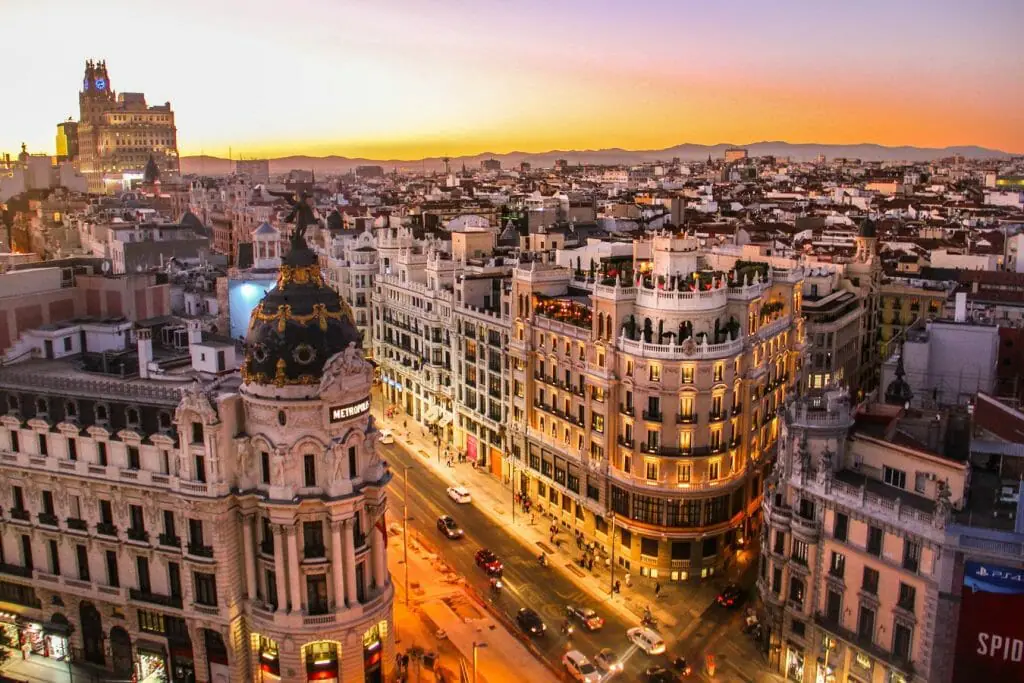Spain, a land imbued with pulsating culture and a tapestry of history, stands out not just for its vivid landscapes, but also as a crucible of queer cinematic artistry, birthing some of the best Spanish gay movies. These films are more than mere entertainment; they are emotive voyages, blending heartache and joy, mirroring the soul of Spain itself.
In the bustling streets of Barcelona, the sun-kissed shores of Valencia, the architectural grandeur of Seville, the vibrant hues of Zaragoza, and the historic charm of Bilbao, the best Spanish gay movies find their heartbeat. These cities, each a microcosm of Spain’s diversity, serve as the perfect backdrops for stories that delve into the depths of human emotion, narrating tales that resonate with a global audience.
The cinematic brilliance of these best Spanish gay movies lies in their fearless exploration of life’s intricacies. They are a celebration and a challenge – a tapestry of narratives that confront prejudices, defy societal norms, and rejoice in the triumphs and struggles of the LGBTQ+ community. By bringing these stories to light, we honor the courage and vision of the filmmakers and actors who have boldly carved a path towards greater representation and empathy.
This journey through the best Spanish gay movies is not just an exploration of film; it is an invitation to experience the fusion of storytelling, the essence of Spain, and the unbridled celebration of queer existence. As we unveil these cinematic masterpieces, they leave indelible impressions, moving and inspiring audiences, awakening a thirst for more.

So, prepare to be enveloped in the magnetic world of Spanish gay cinema – a realm where love, passion, and self-discovery reign supreme. Here, every film is a journey, a reminder of our shared human need for acceptance, connection, and the joy of finding oneself. Embrace the art, feel the pulse of Spain’s vibrant cities, and discover the transformative power of the best Spanish gay movies.
Wondering where to watch? It depends on where you live in the world and which streaming services you have. We link to the streaming service we watch on in each case - be it Netflix, Amazon Prime, Apply TV+, or elsewhere.
You can get one month free of Amazon Pride (or a 6-month trial for students) of Amazon Prime and also get immediate access to FREE Two Day shipping, Amazon Video, and Music. While you won't be charged for your free trial, you'll be upgraded to a paid membership plan automatically at the end of the trial period - though if you have already binged all these, you could just cancel before the trial ends.
Apple TV+ also has a one-week trial, and Hulu has a one-month trial (which can be bundled with Disney!). Another option might be using a VPN to access Netflix titles locked to other regions. Netflix is now available in more than 190 countries worldwide and each country has a different library and availability. US Netflix is (understandably) one of the best.
While we wish everything could just be in one place - for now, it seems these are the best streaming platforms to watch on.


In this article we will cover...
- My Mother Likes Women [A mi madre le gustan las mujeres] (2002)
- Princesses [Princesas] (2005)
- Talk to Her [Hable con ella] (2002)
- Law of Desire [La ley del deseo] (1987)
- The Sea [El mar] (2000)
- Carmen & Lola [Carmen y Lola] (2018)
- I’m So Excited [Los amantes pasajeros] (2013)
- Truman (2015)
- The Night My Mother Killed My Father [La noche que mi madre mató a mi padre] (2016)
- The Last Match [La partida] (2013)
My Mother Likes Women [A mi madre le gustan las mujeres] (2002)
My Mother Likes Women is a compelling and thought-provoking Spanish film. Directed by Inés París and Nacho Pérez, this cinematic gem showcases the talent of the co-directing duo while exploring themes of love, family, and sexuality.
Inés París is a respected filmmaker known for her contributions to Spanish cinema. She has a knack for crafting intimate stories that resonate with audiences. Nacho Pérez, on the other hand, has made a name for himself as a writer and director, often delving into unconventional narratives. Together, they bring a unique vision to My Mother Likes Women.
The film revolves around the lives of three sisters, Elvira, Jimena, and Sol, who are astonished to discover that their mother, Sofía, is in love with a much younger woman, Eliska. This revelation throws their lives into turmoil as they struggle to come to terms with their mother’s newfound sexuality. París and Pérez deftly navigate the complex dynamics within the family, depicting the sisters’ individual reactions and the subsequent impact on their relationships.
The film courageously portrays a lesbian relationship and delves into the challenges faced by the characters in a society that may not readily accept their love. It sensitively addresses issues of sexual orientation, identity, and acceptance, offering a nuanced perspective on the experiences of queer individuals and their families.
This heartwarming and insightful film offers a fresh take on family dynamics, challenging societal norms, and the power of love. Its compelling performances, engaging plot, and rich portrayal of Madrid make it a must-watch. Prepare to be moved and enlightened by this remarkable cinematic experience.
Princesses [Princesas] (2005)
Princesses is a remarkable film directed by Fernando León de Aranoa, a renowned Spanish filmmaker known for his profound storytelling and social commentary. León de Aranoa has established himself as a prominent figure in contemporary Spanish cinema, with his previous works displaying a remarkable sensitivity to societal issues and the human condition.
The film revolves around the lives of two women, Caye and Zulema, who form an unlikely friendship in the vibrant city of Madrid. Both facing their own personal struggles, Caye works as a prostitute while Zulema is an immigrant from the Dominican Republic. As their friendship deepens, they find solace and strength in each other, navigating the challenges of their respective lives.
Princesses is a film that captivates audiences with its raw emotions, compelling performances, and thought-provoking themes. It invites viewers to reflect on the complexities of human relationships, social issues, and the power of friendship. By shedding light on marginalized communities and addressing LGBT themes, the film opens up discussions on important topics that resonate far beyond the screen.
Princesses is a captivating and thought-provoking work that offers a unique perspective on contemporary society. Through its powerful storytelling and remarkable performances, the film invites audiences to empathize with its characters and gain a deeper understanding of the human experience. Princesses is a true gem that deserves to be appreciated and cherished for its remarkable artistry and profound impact.
Talk to Her [Hable con ella] (2002)
Pedro Almodóvar, a renowned Spanish filmmaker, has established himself as a prominent figure in world cinema with his unique storytelling style and exploration of complex themes. With films that often challenge societal norms, Almodóvar has crafted a diverse filmography that includes the emotionally gripping drama, Talk to Her.
Talk to Her revolves around the lives of two men, Benigno and Marco, who form an unlikely friendship as they care for two comatose women. The film explores themes of loneliness, obsession, and the power of human connection. As the story unfolds, it delves into the emotional depths of these characters, examining their motivations and the complexities of their relationships.
The film is a masterful cinematic creation that showcases Almodóvar’s ability to craft compelling narratives and elicit powerful performances. With its thought-provoking exploration of human connection and the complexities of relationships, the film offers a deeply emotional and immersive experience for the viewer.
Talk to Her should be watched by anyone seeking a thought-provoking and emotionally engaging film. Almodóvar’s impeccable direction, coupled with the outstanding performances by the cast, creates a captivating experience that lingers long after the credits roll. The film’s exploration of LGBT themes adds an additional layer of depth, fostering empathy and understanding. Talk to Her is a testament to Almodóvar’s prowess as a filmmaker and is sure to leave a lasting impression on its audience.
Law of Desire [La ley del deseo] (1987)
Law of Desire is a captivating film directed by the renowned Spanish filmmaker, Pedro Almodóvar. The film revolves around a complex love triangle involving a film director, Pablo, his transsexual sister Tina, and a young stalker, Antonio. Pablo, portrayed by Eusebio Poncela, finds himself torn between the affections of both Tina, played by Carmen Maura, and Antonio, played by Antonio Banderas in his breakthrough role. As the relationships intertwine, secrets are unveiled, leading to a series of unexpected and dramatic events.
Law of Desire fearlessly delves into LGBT themes, portraying characters who challenge traditional gender norms and societal expectations. Almodóvar fearlessly explores the complexities of desire and identity, offering a nuanced and compassionate portrayal of the LGBTQ+ community. Through his masterful direction, he manages to navigate sensitive topics with a perfect balance of sincerity and dark humor.
Law of Desire is a cinematic gem that offers a thought-provoking exploration of human relationships and the intricacies of desire. Almodóvar’s brilliant direction, combined with the superb performances of the cast, brings the complex characters to life on the screen. This film is a must-watch for those seeking a compelling story with a unique blend of drama, humor, and exploration of LGBTQ+ themes.
The Sea [El mar] (2000)
The Sea is a thought-provoking film, directed by Baltasar Kormákur, an Icelandic filmmaker known for his exceptional ability to captivate audiences with his emotionally charged narratives. Kormákur has made a significant impact on the international film scene, showcasing his versatility as a director through a diverse range of projects.
The film revolves around the life of a middle-aged gay man named Ólafur, who resides in a small fishing village in Iceland. Ólafur, played brilliantly by Gunnar Eyjólfsson, leads a lonely existence, haunted by the loss of his long-time partner. However, his life takes an unexpected turn when a young man, named Baldur (played by Hilmir Snær Guðnason), arrives in the village and forms a deep connection with Ólafur. The budding relationship challenges societal norms and confronts the characters with their inner desires and fears.
The Sea explores sensitive LGBT themes with grace and authenticity, offering a heartfelt portrayal of love, loss, and the struggle for acceptance. The film delicately delves into the complexities of identity, highlighting the universal longing for connection and the strength required to overcome societal prejudices.
The Sea is remarkable for its storytelling, powerful performances, and its nuanced exploration of LGBT themes. The film offers a poignant and honest depiction of love and the human experience, challenging viewers to question their own perceptions and prejudices. With its evocative cinematography and moving performances, The Sea is an emotionally resonant cinematic experience that should not be missed.
Carmen & Lola [Carmen y Lola] (2018)
Carmen & Lola is a remarkable film, directed by Arantxa Echevarría. Echevarría, a talented Spanish filmmaker, is known for her thought-provoking storytelling and unique perspective on societal issues. Her career has been marked by a strong commitment to highlighting marginalized voices and exploring complex themes.
Set in the vibrant backdrop of Madrid’s Gypsy community, Carmen & Lola presents a compelling narrative centered around the lives of two young women. The film follows the journey of Carmen, a spirited and independent teenager, who falls in love with Lola, a free-spirited graffiti artist. The budding romance between the two protagonists’ challenges deeply entrenched cultural traditions and societal expectations within their close-knit community.
Carmen and Lola’s same-sex relationship confronts the traditional values and prejudices prevalent in their conservative environment. Echevarría fearlessly delves into the complexities of identity, desire, and the struggle for self-acceptance, ultimately painting a poignant portrait of love’s triumph over adversity.
Echevarría masterfully captures the essence of the Madrid Gypsy community, providing an authentic and immersive experience for the audience. The film showcases the rich cultural heritage, vibrant colors, and pulsating energy of this distinct community, emphasizing the contrast between tradition and the contemporary world.
Carmen & Lola’s powerful storytelling, combined with Echevarría’s skillful direction, offers a moving and unforgettable experience. Its exploration of LGBT themes, set against the backdrop of a unique cultural milieu, challenges societal norms and invites viewers to reflect on their own preconceptions. Carmen & Lola is a cinematic gem that not only entertains but also enlightens, making it a must-watch for those seeking compelling narratives and social commentary.
I’m So Excited [Los amantes pasajeros] (2013)
Known for his provocative and bold narratives, Almodóvar consistently pushes the boundaries of conventional filmmaking. One of his notable works, I’m So Excited, showcases his trademark flair and humor while delving into complex themes.
Set aboard a troubled plane en route to Mexico City, I’m So Excited offers a comedic and satirical take on the fears and desires of its diverse passengers. As the plane encounters technical difficulties, the crew strives to keep the passengers calm, resorting to outrageous antics and distractions. Amidst the chaos, Almodóvar weaves a web of interconnecting storylines, exploring sexuality, desire, and the pursuit of happiness.
The film boldly incorporates LGBT themes, celebrating the spectrum of human sexuality. Almodóvar fearlessly portrays characters who are unabashedly themselves, defying societal norms and embracing their true identities. Through colorful and flamboyant performances, the film challenges conventions and champions acceptance and inclusivity.
With its vivid cinematography, witty dialogue, and exuberant performances, I’m So Excited is a testament to Almodóvar’s directorial prowess. It is a visual feast that seamlessly blends comedy and drama, engaging the audience from start to finish. The film’s exploration of human sexuality, coupled with its rich and vibrant setting, offers a thought-provoking and entertaining cinematic experience.
I’m So Excited is a testament to Almodóvar’s creative vision and a celebration of the human spirit. Prepare to embark on a journey that will make you laugh, question societal norms, and leave you feeling uplifted and inspired.
Truman (2015)
Truman is a compelling film directed by Cesc Gay, a prominent Spanish filmmaker known for his insightful storytelling and nuanced character development. Throughout his career, Gay has crafted an impressive repertoire of films that explore the complexities of human relationships and emotions. With Truman, he once again demonstrates his ability to delve into the depths of human nature and deliver a poignant narrative.
The film revolves around the character of Julián (played by Ricardo Darín), a middle-aged Argentine actor residing in Madrid. Julián is diagnosed with terminal cancer and, aware of his limited time, he decides to reconnect with his long-time friend Tomás (portrayed by Javier Cámara), who lives in Canada. The two embark on a heartwarming journey where they reminisce about their shared past, reflect on life’s uncertainties, and contemplate the meaning of friendship and mortality.
Tomás, a gay man, navigates his own personal struggles within the context of his friendship with Julián. The film thoughtfully explores the complexities of their relationship, emphasizing the importance of acceptance, understanding, and unwavering support.
Truman is great for viewers seeking a heartfelt cinematic experience. This film is a masterclass in storytelling, offering a profound exploration of friendship, mortality, and the universal human experience. The exceptional performances by Ricardo Darín and Javier Cámara bring the characters to life, allowing audiences to connect deeply with their struggles and triumphs.
Moreover, Truman‘s sensitive depiction of LGBT themes adds a layer of authenticity and inclusivity to the narrative. Prepare yourself for a touching, thought-provoking journey that will leave you reflecting on the value of friendship and the fragility of life.
The Night My Mother Killed My Father [La noche que mi madre mató a mi padre] (2016)
The Night My Mother Killed My Father is a Spanish comedy film directed by Inés París. París, a highly talented Spanish filmmaker, has made significant contributions to the cinema industry with her unique storytelling style and ability to blend comedy with thought-provoking themes. Her impressive career spans over several decades, during which she has established herself as a prominent figure in Spanish cinema.
The film revolves around the character of Isabel, brilliantly portrayed by the talented actress Belén Rueda. Isabel, a successful actress, finds herself trapped in a peculiar situation when her ex-husband, Ángel, played by Diego Peretti, invites her and her current partner, Jorge, to a dinner party at their country house. What starts as a seemingly innocent gathering takes an unexpected turn when the lines between fiction and reality blur, leading to a series of comical and chaotic events.
París skillfully incorporates these themes, highlighting the complexities of relationships and the fluidity of sexual orientations. Through the characters of Isabel and Jorge, the film challenges societal norms and provides a refreshing perspective on love and acceptance.
The Spanish landscape serves as a metaphorical reflection of the characters’ emotional states, alternating between tranquility and chaos. París effectively utilizes the setting to enhance the comedic elements of the film, creating a visually stunning and immersive experience for the audience.
The Night My Mother Killed My Father is a delightful film that seamlessly blends humor, drama, and LGBT themes. With its witty dialogue, stellar performances, and a captivating storyline, this movie offers a refreshing take on relationships and the complexities of human nature. Whether you are a fan of Spanish cinema or simply enjoy thought-provoking comedies, this film is a must-watch. So sit back, relax, and let Inés París take you on a rollercoaster ride of laughter and introspection.
The Last Match [La partida] (2013)
The Last Match is a captivating film directed by Antonio Hens, a talented Spanish filmmaker known for his unique storytelling and exploration of LGBTQ+ themes. Hens has established himself as a prominent voice in the cinematic world, often shedding light on marginalized communities and addressing social issues.
The film centers around the lives of Yosvani and Reinier, two young men living in Havana, Cuba. Yosvani is a talented boxer engaged to a young woman, but he finds himself irresistibly drawn to Reinier, a free-spirited hustler who navigates the underground world of Havana’s male prostitution. Their secretive romance unfolds against the backdrop of Cuba’s complex political and social climate, highlighting the challenges faced by LGBTQ+ individuals in a society that often suppresses their identities.
The Last Match skillfully captures the essence of Havana, with its vibrant streets, dilapidated buildings, and lively culture. Hens masterfully portrays the city as a character in itself, showcasing both its beauty and its struggles. The contrast between the city’s picturesque landscapes and the characters’ hidden lives adds depth to the narrative, underscoring the tension between personal desires and societal expectations.
What sets The Last Match apart is its raw portrayal of the human experience and the exploration of sexuality in a repressive environment. The film not only delves into the complexities of forbidden love but also offers a nuanced examination of the intersections between masculinity, sexuality, and societal pressures.
The Last Match is a fantastic watch for those viewers seeking an evocative and thought-provoking cinematic experience. The film’s compelling storytelling, powerful performances, and sensitive handling of LGBT themes make it a must-watch. It invites audiences to reflect on the universal struggle for self-acceptance, while shedding light on the unique challenges faced by LGBTQ+ individuals in Cuba. Prepare to be moved and captivated by this poignant exploration of love, desire, and the human spirit.


